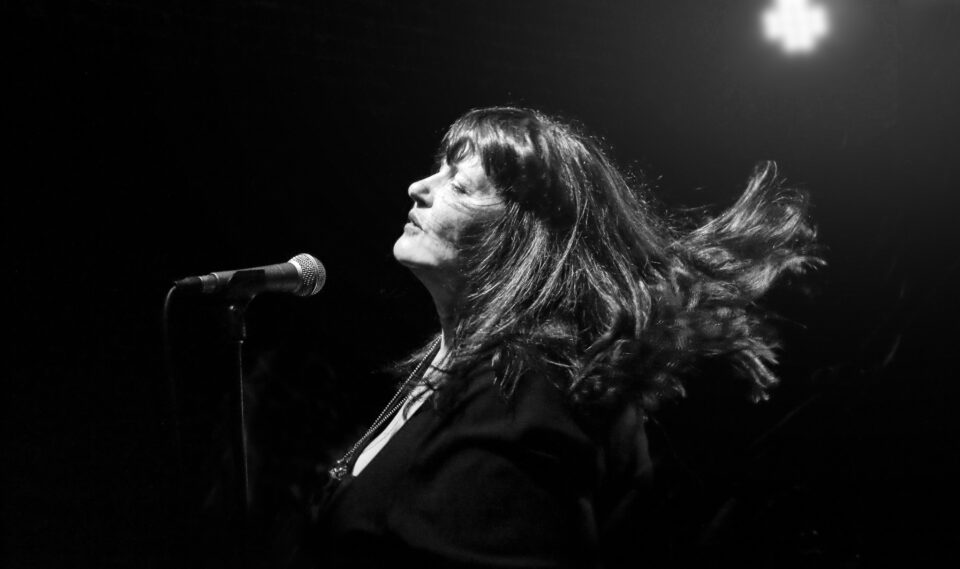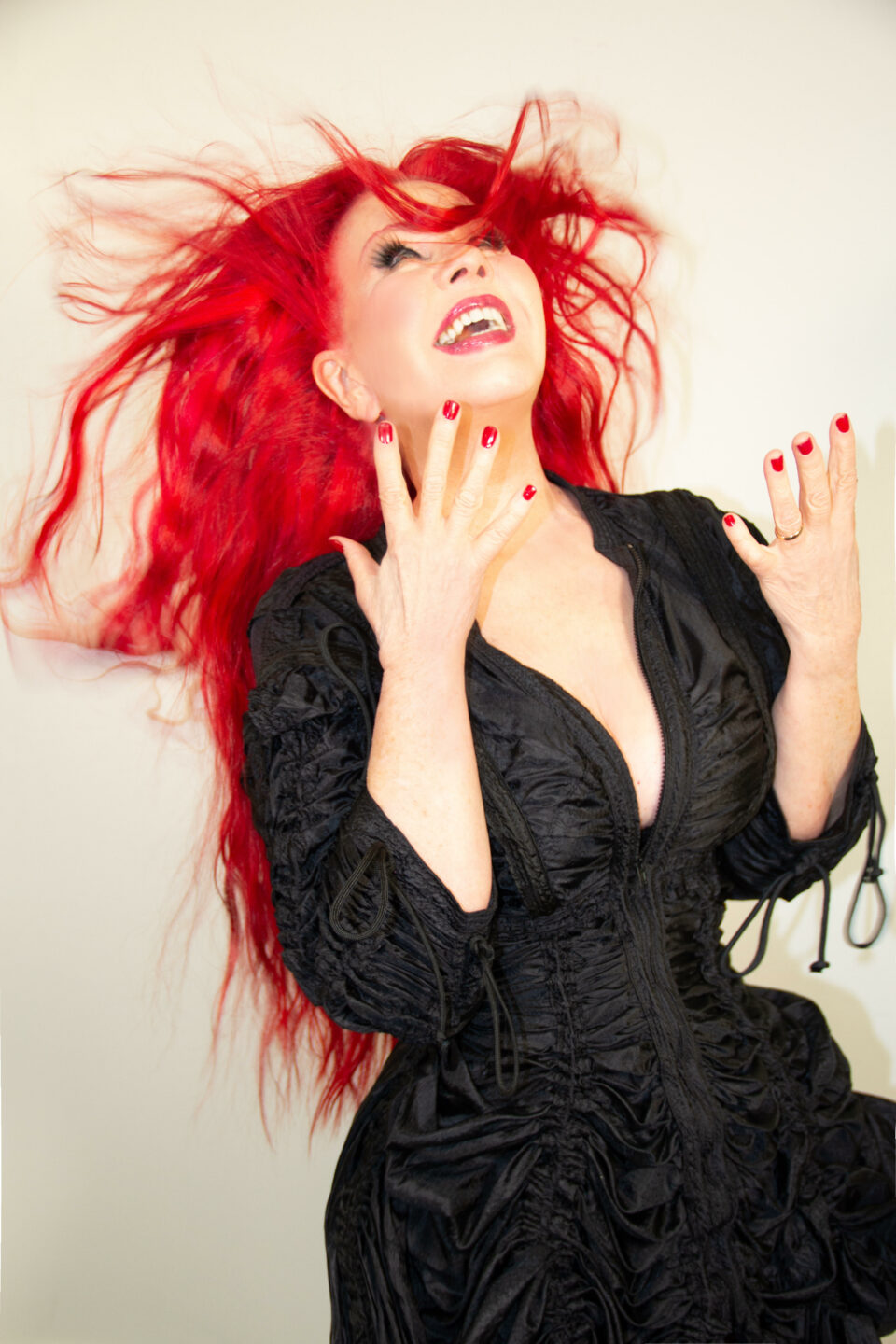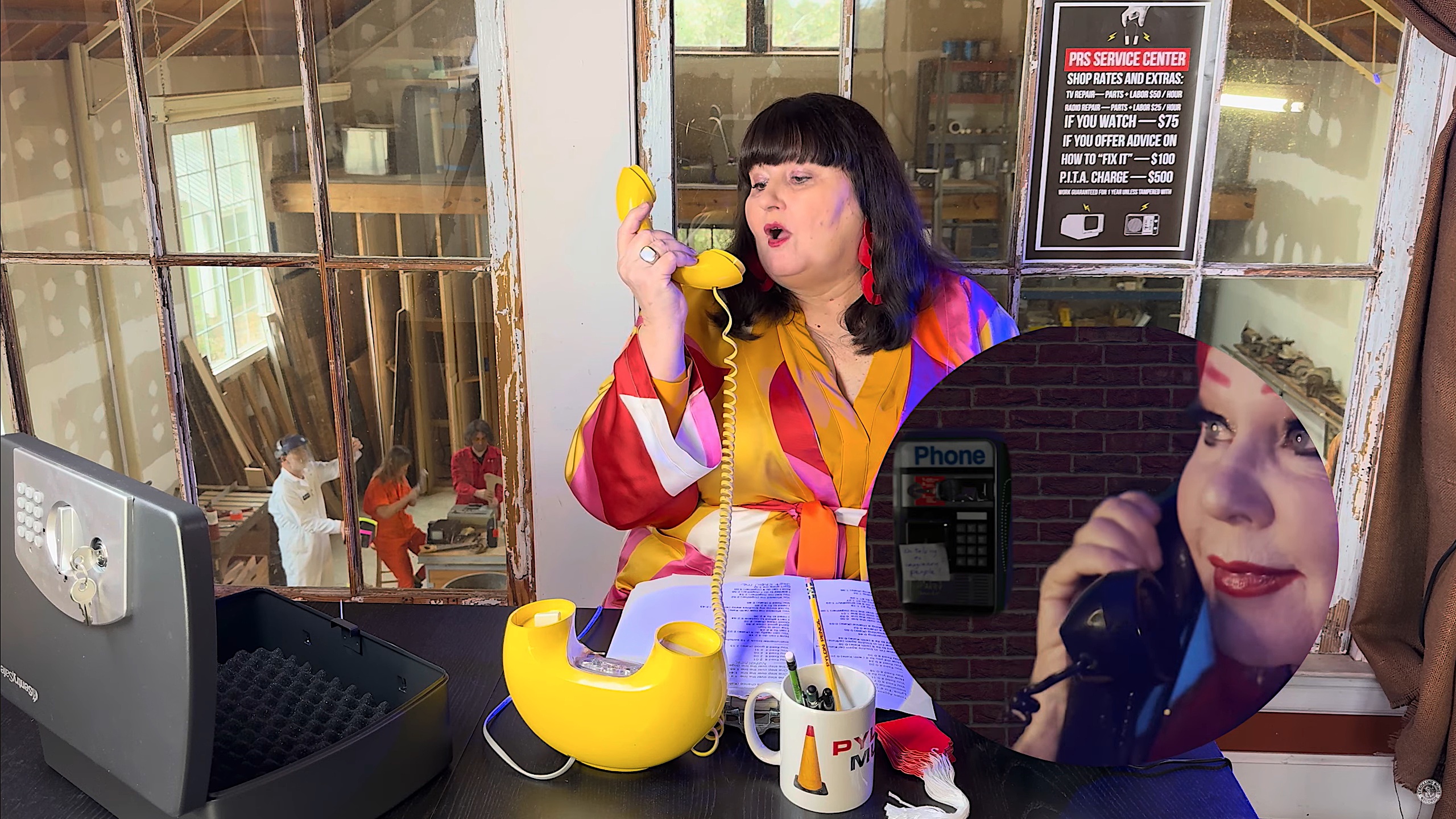Before joining our video chat, Vanessa Briscoe Hay was in the midst of signing 1,000 copies of Magnet Factory, the album her band Pylon Reenactment Society will put out this Friday. She considers this a debut album, but she’s far from inexperienced: her original post-punk band, simply named Pylon, helped create the music scene in Athens, Georgia—a scene that went on to become one of the world’s biggest hotbeds for alternative rock. Other Athens bands have consistently cited Hay and her bandmates as a crucial influence (including R.E.M., who covered Pylon’s “Crazy” on their 1987 album Dead Letter Office). Between 1980 and 1990, Pylon released three iconic albums, so this resurrection under the new moniker is much anticipated.
Moments later, Kate Pierson pops up on the screen. She’s calling in from her home in Woodstock, New York—though she, too, was a prime mover in that same Athens scene when it first began in the mid-1970s. With her new wave dance-rock band The B-52’s, she’s released several hit singles, including “Love Shack,” “Rome,” and “Rock Lobster.” Like Hay, Pierson is also on the verge of releasing an album, Radios and Rainbows, which is her second solo effort. She says it will come out by April.
Despite their dissimilar personalities—Pierson is chatty and exuberant, much like her onstage persona; Hay is, in contrast to her frenzied stage presence, more reserved—their genuine affection and respect for each other is obvious. Their easy camaraderie leads to an hour-long chat that finds them reminiscing about their shared history and looking ahead with excitement about what’s coming next.

Vanessa Briscoe Hay / photo by Scott Sturdy
Vanessa, how did you know it was the right time to do this album with Pylon Reenactment Society?
Hay: We call ourselves the “Pylon Reenactment Society” because I’m the only original member. We do use Pylon as our guiding star, but…it’s a different thing. [Magnet Factory] is a debut album. It doesn’t feel odd to me because, I mean, isn’t life all of a piece? We start our lives at Point A and we work our way through all these different aspects of being a human being. If you’re an artist, you do the work when you can, and this is just the way it’s worked out. I’m extremely happy and excited at my age to be coming out with a new album, and I hope people love it. And I’m so excited my friend Kate Pierson agreed to do a song [“Fix It”] with us.
Pierson: I cannot believe we haven’t collaborated [before], because Pylon has always been one of my very favorite Athens bands. Because my wife Monica is always fixing things, I’m always [singing], “Fix it, you’ve got to fix it!” I just keep singing that song!
Hay: I adore Kate, and I’m a very early fan of The B-52’s. I mean, I just worship all of them. We were in the process of recording and mixing in the studio the last time they played Athens. I was watching Kate onstage, and I was like, “She would be so damn perfect on that song.” And so on my way out, she walks up to me to say goodbye and I said, “Kate, would you consider recording a song [with us]?” And I just couldn’t believe it when she said yes.
Pierson: Of course! It was so much fun, and such an honor to me to be on a Pylon Reenactment [song]. And I’ve always admired Vanessa, who is like a whirling dervish onstage. You’ve always impressed me so much with your vocals and stage presence, and everything is just so original. And that’s what I love about all the Athens bands: they’re all so unique.
And Kate, you say you’ll also have an album coming out by April…
Pierson: [In October] I launched a first single called “Every Day Is Halloween.” I released Guitars and Microphones, my first solo record, in 2015, so [this album] has been a long time coming. It’s going to be called Radios and Rainbows.
Hay: Oh, I love that!
Pierson: I think it’s sort of a continuation of the first record. It’s more personal. It’s very different from The B-52’s. I have mostly upbeat songs, but they’re not necessarily dance songs. There’s one song I wrote with Sia from way back, and the others are with different collaborators who mostly did the instrumental parts. I think it’s just so much fun to write lyrics that kind of come from somewhere in the collective unconscious, because you can never tell when you write lyrics. You think of something, and then it just starts pouring out, and sometimes it’s not what you thought it would be.

“I’ve always admired Vanessa, who is like a whirling dervish onstage... And that’s what I love about all the Athens bands: they’re all so unique.” — Kate Pierson
Hay: I agree. I don’t know where the lyrics come from. I don’t know where ideas come from, either. If I did, I might visit that place more often. The creative process is so interesting. If you’re open to it, I think anyone could do it. But a lot of people, I don’t know, something happens to them. Especially women are made to feel that maybe their viewpoints and feelings and ideas are not quite as valid as they should be.
Pierson: Exactly.
Both of you started out in the 1970s, when it really wasn’t common for a woman to be in a band, let alone be a leading member. How did you each know that you should do it?
Hay: I was recruited into it. The guys in Pylon asked me to come audition. Actually, [Pylon guitarist] Randy Bewley saw something in me that I didn’t realize was there.
Pierson: I’m curious to know what the audition was like. Did they have a song for you to sing, or did you just go and let it fly?
Hay: I came in and there was a microphone, there was a music stand that had an orange vinyl three-ring binder, and Michael Lachowski [Pylon’s bassist] had written some lyrics for five songs. They would play the song, and then I would attempt to make the lyrics fit the music. But Michael wasn’t thinking about rhythms when he was writing these lyrics, so I might have to really extend a word out to get it to fit, or clip them together really closely in an odd kind of way. I don’t think they could hear me very well because they were so loud, but they saw that I was putting some good effort out, and they just liked me, so I was invited in. I guess they had three or four guys audition that didn’t work out—including one who brought a guitar in, had ideas. They didn’t want somebody to come in with ideas. They wanted the ideas to develop together as the band.

Pierson: Yeah, that’s how we always worked, too. But I mean, when they asked you to join, they got a force of nature, because you, onstage, are truly something awesome and compelling.
Hay: Well, thanks so much. I feel like I’ve come full-circle in some ways with this new album, working with some people who are about 20 years younger than I. They’re just so on top of it.
What about you, Kate—how did you become a musician?
Pierson: I always wanted to be a singer, and sometimes the path that you take is just controlled by the hand of fate. And I wound up in Athens, Georgia. It’s a long story, but I wound up there in a “getting back to the land” thing and I met the rest of the band. We just started jamming one night. We have three singers—it’s not conventional. And no one ever said, “Let’s get together and start a band.” It just formed organically. We jammed and taped everything on a cassette recorder and then collaged the pieces together, which is why we have such an unusual lineup and song structure. Being a woman in the band, it didn’t seem unusual. A lot of punk/new wave bands had women, so I think that was another evolution from the ’70s guy-band dominance.
“I met [Kate] when [she] and some of the other B’s crashed a party. They all came in and started dancing really wild. Just crazy. And I was like, ‘Who are those people? I want to know them!’” — Vanessa Briscoe Hay
Do you remember the first time the two of you met?
Hay: I do, but let’s see if Kate can remember!
Pierson: Oh, it must have been at a party…
Hay: Yes. I actually met you when you and some of the other B’s crashed a party. They all came in and started dancing really wild. Just crazy. And I was like, “Who are those people? I want to know them!”
Pierson: It’s coming back to me now. I remember that party!
Do you feel pride in knowing you helped make Athens one of the most enduring music scenes in the world?
Pierson: I mean, we never dreamed we’d be here so long, still playing. And we have this Vegas residency now—we’ve done two of them; we have another one in April. We’re trying to write one song for our documentary that we’ve been working on for the past few years, so maybe we’ll get out one more B-52’s song. And then maybe that will lead us to more.
Hay: I think artists are wired like that, to be creative. We just do it whether anybody cares or not! FL









